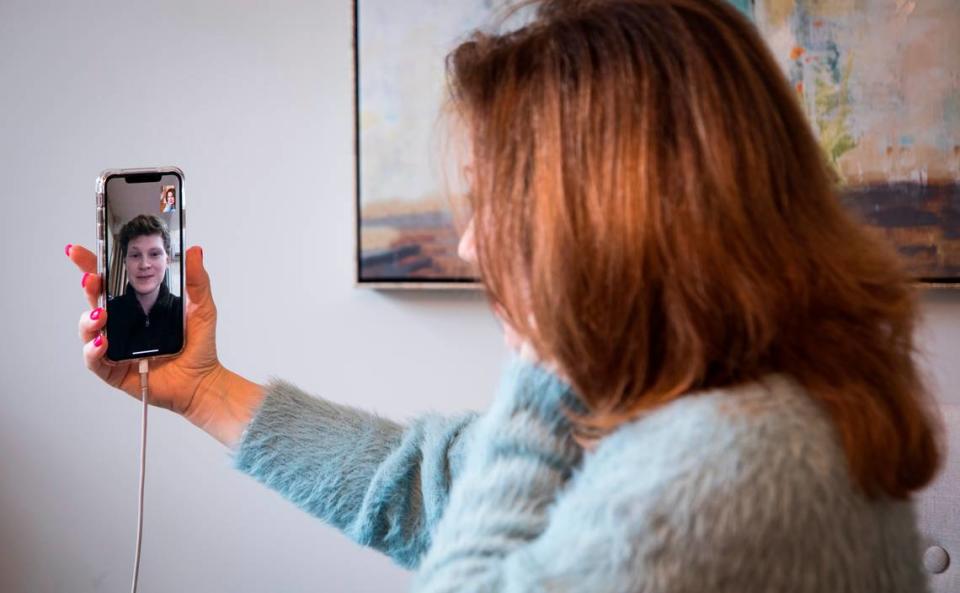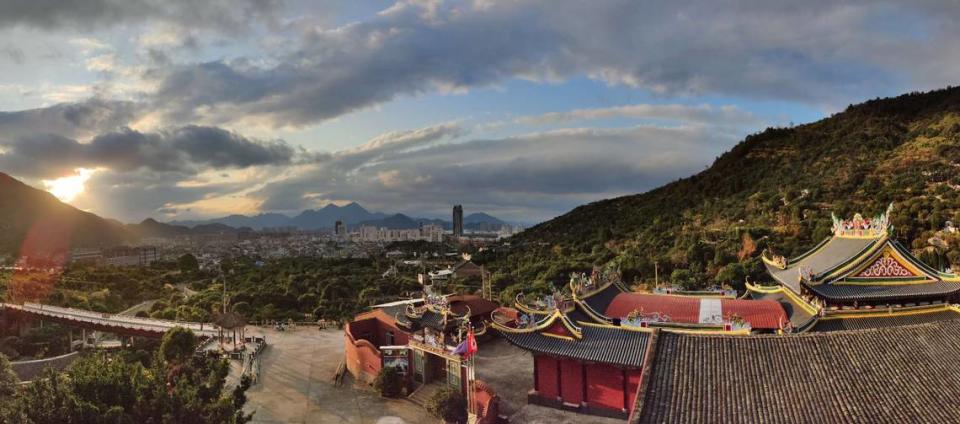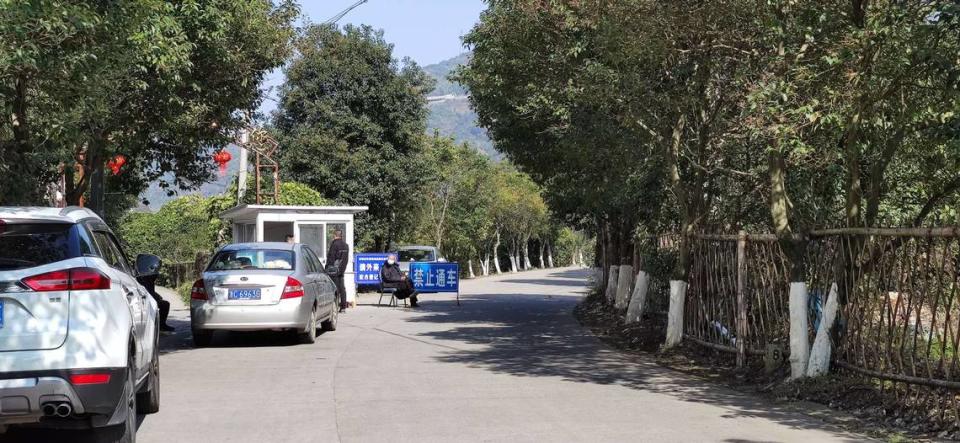Coronavirus keeps NC student quarantined in China. In Raleigh, his mom worries and waits.
Note: The News & Observer and McClatchy news sites have lifted the paywall on this developing story, providing critical information to readers. To support vital reporting such as this, please consider a digital subscription.
Every 10 days or so he puts on his respirator mask, hops on his electric bike and rides through the empty streets of Wenzhou, China to get to a grocery store about a mile away.
He stocks up on foods that won’t go bad, like pasta, rice, beans and frozen chicken and vegetables. He doesn’t talk to anyone but the cashier and doesn’t see many people while he’s out.
Then he bikes back to his apartment, passing the barricades and closed restaurants and businesses that are usually bustling in this college town.
He lives alone in an apartment in a temple, where he stays inside all day, mostly staring at his computer screen working on his thesis paper.
Spenser Rose, a 25-year-old graduate student from Raleigh, has been in quarantine for weeks in China, the epicenter of the coronavirus outbreak that’s killed thousands. He’s there getting a master’s degree at Wenzhou University, which has been closed because of the virus.
“It doesn’t really matter when you wake up,” Spenser said. “No one is going to see you. You can’t go anywhere.”
Do you have questions about the coronavirus? The News & Observer will get the answers for you. Go to bit.ly/virusnc and let us know what you need to know.
The dark skies and cold, rainy weather don’t help. It just makes the whole atmosphere even more depressing and eerie, he said.
“I don’t feel like a prisoner, but it’s not inviting to go outside right now,” Spenser said. “There’s nothing to do. I can’t see my friends because they’re locked up in the dorms.”
Looking for regular updates on the Coronavirus in NC and across the nation? Sign up for our daily newsletter at newsobserver.com/coronavirusnews to get a daily email summary.
His mother back in Raleigh is terrified every day.
“I literally wake up at like four in the morning and, just, it’s like a panic,” said Suzanne Rose. “He’s like completely on his own.”
She’s worried about him getting sick and her not knowing where he is, how to get in touch with him or the hospital and who’s taking care of him.
“Every day I think, should I have pushed for him to come home?” Suzanne said. “It’s just a terrible thought to think that you’ve made the call and you made the wrong one.”
A mother’s nightmare
Suzanne sits in her Raleigh dining room to Facetime the son who’s alone in his apartment nearly 8,000 miles away. It’s nearly midnight his time and the WiFi is spotty, so there are bars blocking his face on the screen. She runs upstairs to get a charger, thinking it’ll help the connection and calls him back.
This has become part of her daily routine.
She asks about his day and whether he’s been working out. He tells her about the burritos he made earlier and puts on his face mask and aviator glasses, which make her laugh.
“We don’t talk about anything interesting, but I try to keep him company,” Suzanne said. “I’m hoping that it just ends soon.”

They try to talk twice a day, but the 12-hour time difference and unreliable internet connection make it difficult sometimes.
“I said ‘look you need to let me know that you’re alive,’” Suzanne said.
If he can’t talk, Spenser will send her a text that says “I’m alive” or “sup mom” to keep her calm.
“He certainly hasn’t had the fear that I’ve had,” Suzanne said.
She wonders if he’ll run out of food or toilet paper. She doesn’t know who she’d call if he gets sick or if the school or the U.S. government would even help.
When she first heard about the virus spreading in January she wasn’t sure how alarmed to be and had a sense that it might just blow over.

The family talked about him coming home, but it would cost thousands of dollars and Spenser was eager to stay to finish out the school year.
It was also risky to travel because he’d have to take a train and fly through multiple cities that also have coronavirus outbreaks.
“To travel home is fraught with possibly more danger than to stay,” Suzanne said. “That is a terrible tension.”
“And is he going to be any safer there than here now?” she said.
North Carolina announced its first coronavirus case Tuesday. Ten people have died in the U.S. as the outbreak continues to spread. There have been thousands of cases across China, including in Wenzhou.
Suzanne said she’s afraid Spenser will get the virus, but the worst feeling is the helplessness that there’s nothing she could do.
“The thing that kills me as a mother is that he’s there,” Suzanne said. “He’s just by himself.”
Life in quarantine
Spenser is getting his master’s degree in entrepreneurship at Wenzhou University. He graduated from Appalachian State University with a degree in international business and a minor in Mandarin Chinese. He earned a full scholarship to attend the three-year MBA program at Wenzhou, where he’s set to graduate in July.
He and his mom knew there would be issues going to school across the world in a foreign country, but they never expected a global pandemic to be one of them.
“It’s something out of a sci-fi nightmare,” Suzanne said. “It’s like you just couldn’t even think of this as a possible challenge to deal with.”
On an ideal day, Spenser wakes up and does a 10-minute cardio workout and lifts weights on the yoga mat in his room. He makes breakfast, checks the news and his email and calls friends or family. He also answers a few questions from the university, which checks in with students each day. Then he just plugs away on his thesis, which he said has actually been going pretty well because there aren’t many distractions.
“It’s more or less the same day,” Spenser said. “Time has no meaning here. It hasn’t had meaning for a month.”
He said he’s a little bit afraid of getting infected, but he’s careful when he leaves his house and he feels like the outbreak has been somewhat contained.
“The government has essentially stopped the daily life of most people in China,” Spenser said.

The university is closed until at least May, and Spenser said he sees one human being about once a week. When he talks to other people, it’s usually through a screen.
The one bright spot in his self-imposed quarantine is Daluo Shan mountain, which he can see from the window of his room. He takes breaks from looking at his computer or reading his books to look out at the mountain when his eyes start to hurt.
Spenser said he’s getting a little bit of cabin fever, but he feels lucky compared to his friends who can’t leave their dorms on campus. They’ve been getting food and supplies delivered for weeks.
“My fellow classmates staying at the international student dorm, they’re locked in,” Spenser said. “They can’t leave the area and haven’t been able to leave since early February.”
But they do have a pool table at the dorm, which makes him a bit jealous.
LISTEN TO OUR DAILY BRIEFING:
Here's how to listen to our Daily Briefing on your favorite smart speakers and podcast playlists.
The lockdown in Wenzhou
The province where Spenser lives is about 500 miles or 10 hours from Wuhan, where the coronavirus was first identified.
He first started hearing about the virus when he was traveling to Thailand for winter vacation in mid-January, but he didn’t pay much attention to it.
When he came back a week later, he saw a lot of people wearing masks at the airport and started to get concerned.
“Then the next seven days, (things) started to escalate,” Spenser said.

Wuhan is a major transport hub, and the Chinese Lunar New Year meant millions of people were traveling in January. Spenser said the week before the holiday is called the “golden week” because everyone is trying to get to their hometown.
“It’s probably not good that this thing broke out during that time,” Spenser said.
He was a little afraid of getting infected right when he got back because he’d traveled through Hong Kong and Shanghai. But he said he hasn’t been sick.
In early February, Chinese authorities expanded the coronavirus lockdown to Wenzhou to try to curb the spread of the respiratory illness. That included more than 30 million people, some of whom were literally locked in their homes, according to The Washington Post.
Spenser said there were military checkpoints at the entrances to major roads. He’d have to pass a temperature check to make sure he didn’t have a fever before getting on a highway. Then, makeshift barricades started going up around his apartment. The lines stretched out the door of grocery stores and the pharmacy as people stocked up on supplies.
A few weeks ago, only one person from each household was allowed to leave the house once every two days to buy supplies. He received a government-issued pink piece of paper that he’d have to get stamped by officials every time he went out somewhere.
“I was afraid of not having enough food,” Spenser said.

During the first few weeks of the outbreak, he wondered how long it would last and how bad it would get. He’s taking it day by day until things change.
“It seems to have stabilized,” Spenser said. “But there’s that [fear] hidden in the back of your mind that it could always go back to how it was before.”
The restrictions have loosened, but the barricades still stand and the streets are still barren.
“Right now, it’s a rough time,” Spenser said. “I’m just looking forward to like three months from now.
“That’s when life will be nice again.”

